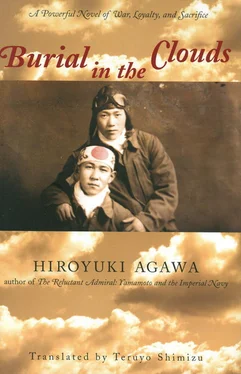It’s my twenty-fifth birthday.
Training flights keep us occupied every day. Around here, when the cold, damp northeastern winds start to blow in the evening, a thick fog streams in from the sea. If I look at the broad ocean from the air, I can watch as the dense fog bank creeps in over the surface of the water, moving to the southwest, in handfuls. The altitude of the fog is less than one hundred fifty meters, and eventually it engulfs the airfield, reducing visibility to ten meters or less. And then abruptly, it starts to clear away in places, as if a curtain were being raised. But the evening sun shines full on my plane, fog or no fog, and as I fly freely over the drifting clouds, or over the banks of fog, I always experience anew the strange fascination of riding through the sky. It delights me. Still, I guess it’s inevitable now that the decisive battle will be fought on mainland Japan. Assuming that the nearby Kashima Sea and Kuju-kuri Beach are among the most imperiled sites ( these are certainly not “somebody else’s affair”), I look carefully down at the shoreline, hoping to spot some new defense works, each time I fly. But I see nothing of the sort. What do they intend to do?
The raids against the Tokyo-Yokohama district have rapidly intensified. Five hundred B-29s and one hundred P-51s flew over at around nine o’clock yesterday morning, for the most part concentrating their attack on Yokohama. This was the first time that their fighters and bombers flew over together in droves, and in broad daylight, too. Even the skies over Hyakuri-hara darkened during the attack, as if blanketed in thick clouds, so that some of the men said, “Is it going to rain?”
We had a ration of strawberries in the evening. Red, glossy, and sweet. Each time I see a rabbit-ear iris or eat strawberries, I appreciate the occasion deeply. I take it as the last blessing of the season.
Hyakuri-hara Air Station is responsible for patrolling a fan-shaped area of the sea to the east of Inubo-zaki and the Onahama line. Every day, reconnaissance crews set out to scour this zone. Each plane departs from the pivot of the fan, proceeds along its individually designated line (constituting, say, one rib of the fan), and then traces a path back down the adjacent line in a route that forms a long isosceles triangle. Along some of these lines, however, one cannot fly without being shot down, or so it’s believed, anyway, almost like myth. There might be a logical reason behind this, such as that the regular incursions of enemy fighters cross our patrol lines there at a slight angle, but whatever the case, we simply can’t avoid patrolling these routes. And they are always assigned to former student reservists, never to an officer from the Naval Academy.
I don’t know what will ultimately be written about the Imperial Navy, or about the education men receive at the Naval Academy, with its (supposed) spirit of patriotic self-sacrifice. I have no idea what the future will say about any of this. But how often the precept “A superior officer’s order is implicitly the order of the Emperor himself” is used, conveniently, to provide cover for essentially selfish acts! And the problem is not confined to naval air stations like Hyakuri, I should think.
According to the commanding officer, we have lost radio contact with Okinawa. It’s raining again today. The rainy season seems to have arrived.
In the afternoon, we had a lecture on special attack maneuvers. I’m constantly sleepy. Nowadays, enemy planes might be flying in overhead all day long, but still, I’m simply sleepy.
While our bodies are overcome with fatigue, our minds are somehow eager, and a pseudo-elegant aestheticism is now in fashion at this base. Poetry readings, flower arranging, what have you. The buckwheat is in bloom, the peony also. As have many others, I arranged, free-style, a large bouquet of Chinese peonies, together with sprigs of azalea, in a basin I had on hand. Complacently, I flatter myself that the result looks pretty good. In a farmer’s house I saw some silkworms feeding on mulberry leaves, making their faint noises, and it brought back distant, sweet memories of my boyhood, when I myself raised a few silkworms in a box, with holes pierced in it. It feels as if I were looking back at my life in its closing years.
The pseudo-elegance continues. I look out for various flowers, and learn the names of them. Buckwheat, tomato, thistle, coreopsis, asthmaweed, red smartweed, wild rose, water lily, sago palm, Reeve’s meadowsweet, gladiola, pomegranate (I remember seeing this in Minamata last year, a red, stiff-looking flower), zinnia, marguerite (white petals with a yellow center), cornflower (the German national flower), fringed pink, pink, sacred bamboo, kabotcha, cucumber, eggplant, dahlia, evening primrose, chestnut, and rose moss.
And there are more. Some off-season flowers, too. Common dayflower, bindweed, dokudami, hydrangea, garden balsam, stone leek, tiger lily, daikon, garden stonecrop, castor-bean, and Indian strawberry.
We flew in formation over Lake Kasumiga-ura. I saw a thin cloud drifting two hundred meters above the surface of the lake, in a strip some thirty meters wide.
I hear that various kinds of “special attack” aircraft are now being tested. The “Kikka” is said to be particularly promising. This is a jet-propelled, twin-engine aircraft that boasts a cruising speed of three hundred knots. But then again, I remember that Germany was herself hardly lacking in prototype weapons, and she was defeated just before any of them went into use.
A new special attack force has been organized. I’m first on the list. I feel suddenly awake. I move at once to Kisarazu, in Chiba Prefecture. Looks like it’s my turn to make a sortie.
They held a send-off party for me. No sake. We sang together and made believe we were drunk. I leave here tomorrow. I will know all once I arrive.

Farewell note 1.
To my parents.
Jiro
July 9, Showa 20 (1945)
At Kisarazu Naval Air Station
I haven’t written you for a while. I moved to this area hastily at the end of June. The enemy task force left Saipan, and its whereabouts have been unknown for the last two or three days. We think it’s highly probable that they will invade the mainland this morning, so we have been on standby since four o’clock. I’m writing this note beside my plane. As soon as we locate the task force, I will set out as part of a special attack force.
I am immensely grateful for the twenty-five years of care and love that you have given me. I appreciate what you must be feeling, but I truly hope that you are assured I go in peace and am content with my mission; and also that you will not grieve too much about my fate.
Various things have set me to brooding, but last night I had a good dinner and slept deeply. When the time comes, I believe I really can embark with a light heart, just as so many of my friends have, so please don’t be troubled about me.
May you be in good health whatever comes, that is all I earnestly pray for.
There is nothing I must ask you to take care of after I’m gone. No financial problems, no relationships that might need sorting out. Tend to my books as you see fit. There is this person, by the way: Miss Fukiko Fukai, of Minamata, Kumamoto Prefecture. She was very kind to us when we were in training at Izumi. I might have mentioned her to you if I had lived. It is not necessary, though, for you to contact the Fukais, since Fukiko knows nothing of my feelings for her, and since we have not corresponded with each other. I just wanted to tell you about her, as she might come to my mind, together with images of you two, as I crash into my target.
Читать дальше













